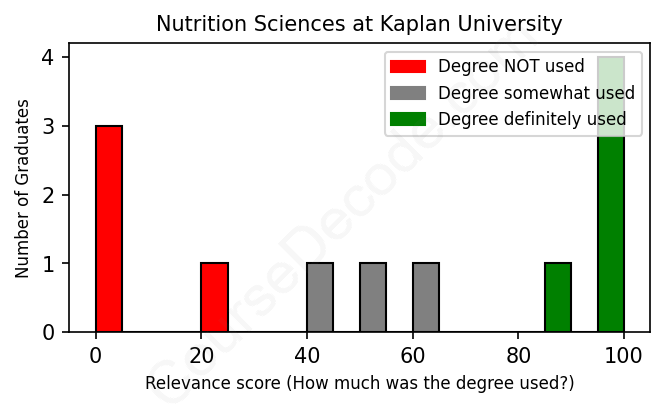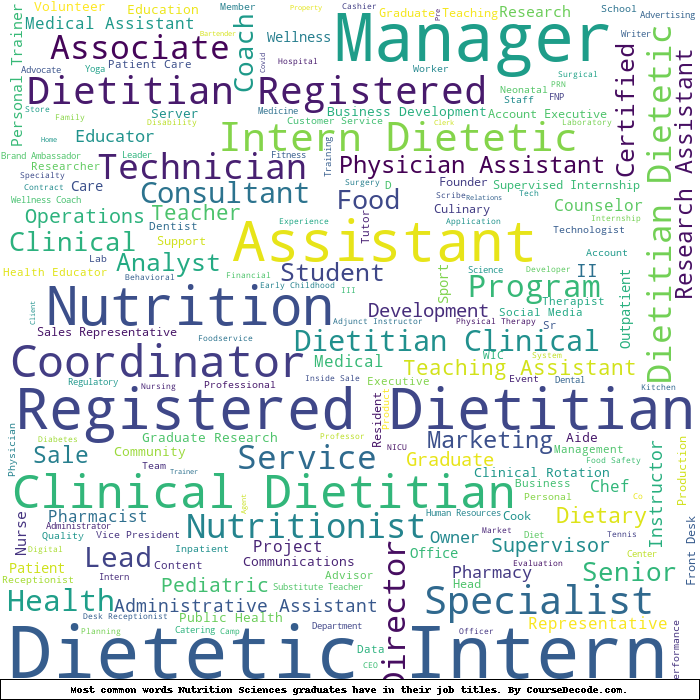
First, some facts. Of the Nutrition Sciences graduates from Kaplan University we've analyzed , here's how many have used (or NOT used) their degree in their career:

These are estimates based on AI analysis of 12 LinkedIn profiles (see below).
The verdict? Significantly below average. Overall, with an average relevance score of 54%, Nutrition Sciences graduates from Kaplan University have a much lower likelihood (-13%) of finding work in this field compared to the average graduate across all fields:
And for comparison, here's the chart for all profiles we've looked at across all degrees.
Also, after graduating, only 16% of these graduates have pursued further education other than another Bachelor's degree (such as a Masters degree or other), compared to the average across all profiles of 35%. This suggests a Bachelors degree is enough for most Nutrition Sciences graduates, and it's normal to look for work straight after graduation.
See the details:
|
Relevance score: 0% We think this person has NOT gone into a career related to their degree. We think this person has NOT gone into a career related to their degree.
DEGREE INFOGraduated in 2016 from Kaplan University with a Bachelor of Science - BS in Nutrition Sciences. No other secondary education since. JOB HISTORY SINCE GRADUATIONCLIENT BILLING REPRESENTATIVE Cordant Health Solutions Apr 2016 - Aug 2019 Accounts Receivable Representative  US ANESTHEIA PARTNERS OF COLORADO Sep 2018 - Jul 2020 Medical Billing Specialist  Assure Neuromonitoring Jan 2020 - Dec 2022 ABOUTHome infusion and durable medical equipment (DME) services, Forensic Toxicology, Anesthesia, and Neuromonitoring experince within the Revenue Cycle Field. |
The top 10 most common jobs done by the graduates we've analyzed (ranked most common to least) are:
After analyzing the career paths of graduates from Kaplan University with a degree in Nutrition Sciences, it's clear that these individuals have taken on a variety of jobs, but not all of them directly relate to their field of study. Many have ventured into positions like customer service roles, retail management, and administrative jobs that don’t require the specialized knowledge they gained in their nutrition courses. For instance, roles such as shift supervisor at CVS Pharmacy or HR Manager at Lowe’s mostly revolve around skills like management and customer relations, rather than any nutritional expertise. Even positions that seem related, like a wellness advocate or activities director, often focus more on general wellness or customer engagement rather than nutrition science specifically.
However, there are some standout roles that truly leverage their education. Jobs like Health Education Specialist, Competent Professional Authority at WIC, and Personal Trainer clearly utilize knowledge from their nutrition background. Additionally, positions like Holistic Nutritionist and Health and Wellness Coach highlight the direct application of what they studied. Overall, while it's evident that some graduates find ways to incorporate their knowledge of nutrition into their jobs, many others have taken paths that don't directly relate to Nutrition Sciences, suggesting a mixed bag in terms of relevance to their degree.
Here is a visual representation of the most common words in job titles for Nutrition Sciences graduates (this is across all Nutrition Sciences graduates we've analyzed, not just those who went to Kaplan University):

When we look at the career paths of graduates from Kaplan University's Nutrition Sciences program, there seems to be a mixed bag of outcomes. A lot of these folks seem to be starting off in roles that don’t directly align with their degree. For example, some graduates took jobs in customer service or administrative roles shortly after graduation. Positions such as a shift supervisor at CVS or customer service at a natural foods store are common, which might not fully utilize their specialized knowledge in nutrition. However, it’s worth noting that some have transitioned into more relevant fields over time, like health coaching, nutrition specialties, or roles in wellness programs.
Five to ten years down the line, it does appear that some of these graduates have carved out careers in areas more aligned with their studies. Roles such as Health Education Specialist, Holistic Nutritionist, and Nutrition Specialist Supervisor indicate a shift towards jobs that are more relevant to their nutrition background. Additionally, positions like Food Service Director highlight some graduates' movement into management roles within the healthcare and nutrition sectors. Still, there are others who have veered off into unrelated fields like home loan specialists or operations directors, suggesting that while some graduates found their footing in nutrition-related careers, others have ended up in quite different industries. So, it looks like the path really varies, and it might take time for some to land a career that truly connects back to their degree in Nutrition Sciences.
Honestly, a Bachelor’s degree in Nutrition Sciences can be a mix of challenging and manageable, depending on your interests and strengths. You'll dive into subjects like biology, chemistry, and human anatomy, which can be tricky if you're not super into science. However, if you've got a passion for health and wellness, that makes it a lot easier to stay motivated. The coursework involves a fair bit of studying, especially since you’ll need to get comfortable with nutritional science concepts and research methods. Overall, it’s probably about average in terms of difficulty compared to other bachelor’s programs—if you’re willing to put in the effort and stay organized, you can totally handle it!
Most commonly, in the LinkedIn profiles we've looked at, it takes people 2 years to finish a Bachelor degree in Nutrition Sciences.
So, looking at these Nutrition Sciences graduates from Kaplan University, it seems like most of them are working in jobs that likely pay okay but not super high. A lot have taken on roles in health and wellness, customer service, and other similar fields, and while those can offer decent salaries, they’re not typically known for big bucks. Some, like the graduates who became wellness advocates or worked in supervising roles, might have good earning potential, especially if they’ve built a solid freelance business or found a good niche in nutrition. Overall, it looks like they’re making a living, but it might not be anything to write home about when it comes to salary—more like a steady paycheck kind of deal.
Here is a visual representation of the most common words seen in the "about" section of LinkedIn profiles who have a Bachelor degree in Nutrition Sciences (this is across all Nutrition Sciences graduates we've analyzed, not just those who went to Kaplan University). This may or may not be useful:

Here are all colleges offering a Bachelor degree in Nutrition Sciences (ordered by the average relevance score of their Nutrition Sciences graduates, best to worst) where we have analyzed at least 10 of their graduates:
| College | Score | Count |
|---|---|---|
 University of Connecticut University of Connecticut
|
85 | 11 |
 Penn State University Penn State University
|
76 | 13 |
 California Polytechnic State University-San Luis Obispo California Polytechnic State University-San Luis Obispo
|
75 | 12 |
 University of New Hampshire University of New Hampshire
|
71 | 10 |
 Arizona State University Arizona State University
|
70 | 12 |
 Texas A&M University Texas A&M University
|
70 | 19 |
 The University of Texas at Austin The University of Texas at Austin
|
60 | 21 |
 Montclair State University Montclair State University
|
59 | 10 |
 Kaplan University Kaplan University
|
54 | 12 |
 University of Arizona University of Arizona
|
46 | 20 |